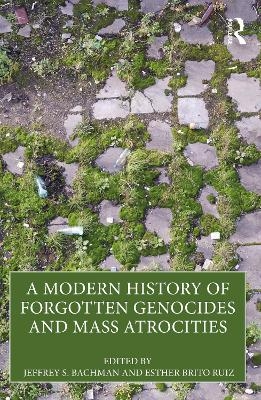
A Modern History of Forgotten Genocides and Mass Atrocities
Routledge (Verlag)
978-1-032-43115-4 (ISBN)
Divided into four thematic sections – Genocide and Imperialism; War and Genocide; State Repression, Military Dictatorships, and Genocide; and Human-Caused Famine, Attrition, and Genocide – A Modern History of Forgotten Genocides and Mass Atrocities covers five continents, including case studies from Biafra, Yemen, Argentina, Russia, China, and Bengal. They range from the French conquest of Algeria in the mid-nineteenth century to the Yazidi genocide perpetrated by the Islamic State in Iraq and Syria between 2014 and 2017, and show that at times of rising authoritarianism, military conquest, and weaponization of hunger, lines between what is war and what is genocide are increasingly blurred. By including genocides and mass atrocities that are often overlooked, this volume is crucial to the ongoing debates about whether “this atrocity or that one” amounts to genocide.
By including key points, events, terms, and critical questions throughout, this is the ideal textbook for undergraduate students who study genocide, mass atrocities, and human rights across the globe.
Jeffrey S. Bachman is Associate Professor at the American University School of International Service, USA. He is the author of The Politics of Genocide: From the Genocide Convention to the Responsibility to Protect (2022) and The United States and Genocide: (Re)Defining the Relationship (2017), and editor of Genocide Studies: Pathways Ahead (2024) and Cultural Genocide: Law, Politics, and Global Manifestations (2019). Esther Brito Ruiz is a PhD student at American University, specializing in mass violence and gender. She is a contributor to edited volumes, including Genocide Studies: Pathways Ahead (2024), and author of academic articles, including “Do No Harm: The Role of Humanitarian Aid and Neutrality in Protracting Civil Wars” (2023) and “The Geopolitics of Human Suffering: A Comparative Study of Media Coverage of the Conflicts in Yemen and Ukraine” (2023).
Part 1: Genocide and Imperialism Introduction 1.The Genocidal French Conquest of Algeria, 1830-1847 2. Assimilation and Dispossession: Cultural Genocide of the Ainu 3. The First Genocide of the 20th Century Part 2: War and Genocide Introduction 4. Biafra and the Politics of Naming Genocide 5. The Yezidi Genocide: An Evolution of Harm 6. A Hierarchy of Political Violence: Yemen and the Question of Genocide Part 3: State Repression, Military Dictatorships, and Genocide Introduction 7. The Role of the 1972 Genocide in Burundi and Its Ramification in the Great Lake Region 8. Genocide in Argentina: Social, Political and Legal Struggles to Frame State Crimes During the Last Military Dictatorship 9. Politics, Class, and Genocide: El Salvador and Colombia in Hemispheric Context Part 4: Human-Caused Famine, Attrition, and Genocide Introduction 10. Starvation, Dehumanization, and Genocide: Moscow’s Imperialism and the Ukrainian Holodomor, 1932-1933 11. Framing Famine British Colonialism and Bengal 12. China's Great Famine 13. Genocide by Attrition of the Nuba Mountains People (1989-mid 1990s)
| Erscheinungsdatum | 18.09.2024 |
|---|---|
| Zusatzinfo | 53 Tables, black and white; 1 Line drawings, black and white; 1 Illustrations, black and white |
| Verlagsort | London |
| Sprache | englisch |
| Maße | 156 x 234 mm |
| Gewicht | 625 g |
| Themenwelt | Geschichte ► Allgemeine Geschichte ► Neuzeit (bis 1918) |
| Geschichte ► Allgemeine Geschichte ► Zeitgeschichte | |
| Geschichte ► Teilgebiete der Geschichte ► Religionsgeschichte | |
| Sozialwissenschaften ► Politik / Verwaltung | |
| ISBN-10 | 1-032-43115-6 / 1032431156 |
| ISBN-13 | 978-1-032-43115-4 / 9781032431154 |
| Zustand | Neuware |
| Haben Sie eine Frage zum Produkt? |
aus dem Bereich


